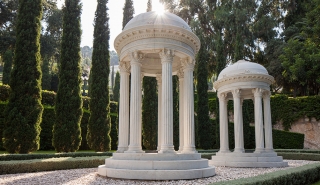Nobility of Navváb

When Bahá’u’lláh was growing up, a lively girl named Ásíyih Khánum lived nearby. She was noble and intelligent, with striking, dark blue eyes. Unlike most girls in Iran at the time, she had learned to read and write. In 1835, when Bahá’u’lláh was about 18, they were married.
They both came from wealthy families. A jeweler worked for six months before the wedding to prepare Ásíyih Khánum’s magnificent jewelry. Even her gold buttons were set with gems. It took 40 mules to carry her possessions to her new home.
Bahá’u’lláh gave His wife the title “Navváb,” meaning “Grace” or “Highness.” Like other noble families, they could have had an easy life with wealth. But they chose a different path. They spent their time helping people in need.
In 1852, their lives were suddenly filled with danger and hardship. Because of His religion, Bahá’u’lláh was thrown into a cold, filthy dungeon in Tihrán called the “Black Pit.” The family was forced from their home, and many of their possessions were stolen.
Navváb and her three children, who were all under nine years old, struggled to survive on their own. They worried about Bahá’u’lláh in the Black Pit. He had little to eat and was tortured by heavy chains, one weighing 112 pounds (51 kg).
After about four months, Bahá’u’lláh was released—but He was banished from Iran. Navváb sold gifts from her wedding to prepare for their travels through the mountains in the dead of winter to Baghdád, Iraq. She was pregnant with a baby, but she endured the rough journey without complaint. Only two of Bahá’u’lláh and Navvab’s children made the trip: ‘Abdu’l-Bahá and Bahíyyih Khánum. Mírzá Mihdí, the youngest, wasn’t well enough to go. About seven years later, he joined his family.
In the years that followed, Navváb continued to share in Bahá’u’lláh’s sufferings during His exiles to what are now Turkey and Israel. She washed clothes and cooked food for her family. But more difficult than anything else for Navváb was the loss of Mírzá Mihdí, who died in ‘Akká, Israel, after a fall at age 22.
In spite of many challenges, Bahíyyih Khánum said that her mother was “queenly in her dignity and loveliness, full of consideration for everybody ... her very presence seemed to make an atmosphere of love and happiness ...”
In 1886, Navváb died in ‘Akká, surrounded by her children and her beloved husband, Bahá’u’lláh, to whom she been married for 51 years.
Bahá’u’lláh wrote of Navváb, “Thou didst attain unto all good, and ... God hath so exalted thee, that all honor and glory circled around thee.” Bahá’ís from around the world pray at her resting place on Mount Carmel in Haifa, Israel.
Images © Bahá’í International Community
Bahá’í Faith515 Bahá’u’lláh150 Israel54 Mount Carmel5 Holy Places34 Family119 Holy Family28 Persecution43 Exile29 Mírzá Mihdí3 BahaLife27